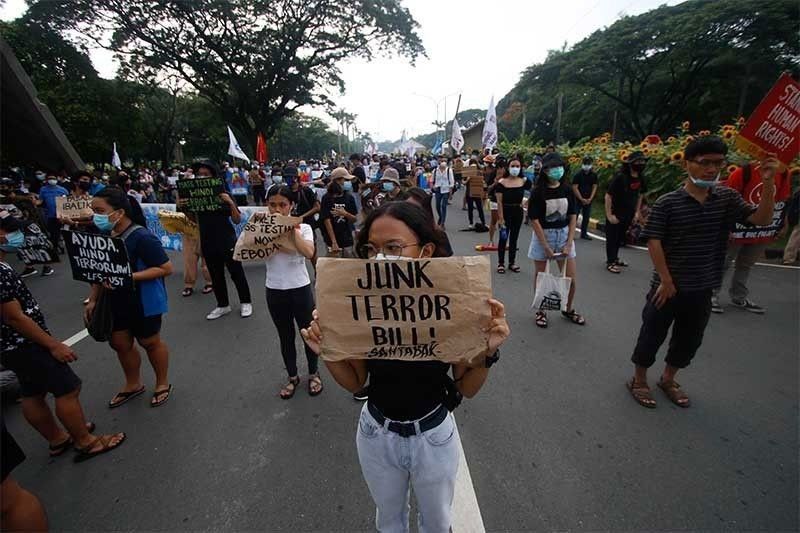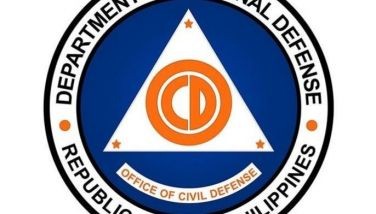‘Major’ terrorist threats targeted

10th petition vs terror law filed
MANILA, Philippines - The Duterte administration will enforce Republic Act 11479 or the Anti-Terrorism Law especially if there is a major terrorist threat, despite the lack of implementing rules and regulations (IRR), Interior and Local Government Secretary Eduardo Año announced yesterday.
Año said the government would implement the law, steeped in controversy and signed by President Duterte on July 3, which took effect Saturday.
“We will still finish the IRR because that’s a requirement. But because the law is already in effect according to the justice secretary, we will apply it, especially if there is a really major terrorist threat against us, we have to apply it,” Año said in an interview on Teleradyo.
More than 40 leaders of cause-oriented groups and academe yesterday filed the 10th petition against the anti-terror law, urging the Supreme Court (SC) to declare RA 11479 unconstitutional and stop the formation of an anti-terrorism council.
Earlier, Justice Secretary Menardo Guevarra said the law took effect on July 18, or 15 days after its publication. But he appealed to law enforcement agents to wait for the promulgation of the IRR.
The anti-terror law was physically published in the Official Gazette on July 6. The July 3 publication was done through the Gazette website.
Although he said that the law takes effect on Saturday, Guevarra appealed for law enforcement to wait for promulgation of the IRR.
“It will be more prudent for law enforcement agents to await the promulgation of the IRR,” said Guevarra.
The law received public outrage even before its passage as it effectively gives broad powers, including surveillance authority and longer detention period, to state agents against individuals tagged by the government as “suspected terrorists.”
Año, former chief of the Armed Forces of the Philippines, said if a similar law had been enforced before, terrorist attacks, including the Marawi crisis could have been prevented.
RA 11479 repealed the Human Security Act, which Año said has many loopholes. He said only one terrorist has been convicted since the law was passed in 2007.
Citing terrorism threats in the country, Año appealed to detractors to give the law a chance.
He assured the public that there would be no abuse of authority from state agents in the implementation of the anti-terror law, adding its provisions have proper safeguards.
“We will not use this law to curtail freedom of expression,” Año said, trying to allay critics’ fears while citing the impact of terrorism on the Philippines.
Petition vs terror law
Forty-four petitioners yesterday filed the 10th petition before the high court electronically, questioning the constitutionality of the anti-terror law.
Represented by the National Union of People’s Lawyers (NUPL), the petitioners filed a 137-page document seeking nullification of the anti-terrorism law.
Named respondents are President Duterte, Executive Secretary Salvador Medialdea, Senate President Vincente Sotto III and Speaker Alan Peter Cayetano.
The NUPL said the physical filing of the petition would be done on July 23 as the SC shut down its offices from July 20 to 22 for coronavirus disinfection.
The petitioners specifically asked the high tribunal to issue either a status quo ante order, a temporary restraining order (TRO) or a writ of preliminary injunction to stop the formation of the Anti-Terrorism Council, which will be the lead implementer of RA 11479 as stated under Sections 45 and 46 of the assailed law.
The petitioners also prayed for the issuance of a TRO or writ of preliminary injunction against the drafting and implementation of the IRR of the anti-terrorist law as well as the formation of the Joint Oversight Committee, which will review the enforcement of RA 11479.
They urged the SC to declare the law “null and void in its entirety.”
The petitioners argued that RA 11479 “insidiously encroaches” upon basic and fundamental rights guaranteed under the Constitution such as the right to due process and to presumption of innocence as well as the right to life, liberty and property.
They assailed the “extremely vague” definition of terrorism under Section 4 of RA 11479, which they said violates the “due process” clause of the Constitution.
The petitioners said Sections 4 and 9 of RA 11479, which refer to acts tantamount to “inciting to commit terrorism,” violate the freedom of speech clause of the Constitution. Section 25, which refers to the “designation of terrorist individual, groups of persons, organizations or associations” violates the constitutional right to due process, right to property, freedom of association and is also tantamount to usurpation of judicial prerogatives.
They said Section 29 of RA 11479, which allows “detention without warrant of arrest” violates the constitutional protection against warrantless arrests and detention without charges. Section 34 or the “Restriction on the Right to Travel” violates the constitutional right to post bail and to travel.
The petitioners include Bagong Alyansang Makabayan secretary general Renato Reyes Jr., Bayan chairperson Ma. Carolina Araullo, Movement Against Tyranny convenor and activist nun Mary John Mananzan, Kaparatan secretary general Cristina Palabay and representatives from progressive groups Kilusang Mayo Uno, Kilusang Magbubukid ng Pilipinas, Health Alliance for Democracy, Pamalakaya, Anakbayan, League of Filipino Students, Salinlahi, COURAGE, Bahaghari, SELDA and Piston.
Also named petitioners are national artist Bienvenido Lumbera, former University of the Philippines president Francisco Nemenzo, former UP Diliman chancellor Michael Tan, former National Commission for Culture and the Arts head Felipe de Leon Jr., former social welfare secretary Judy Taguiwalo and former Bayan Muna representative Teddy Casiño.
The other petitioners are human rights defender Edith Burgos, civil libertarian Renato Constantino Jr., playwright Bonifacio Ilagan, Bishop Deogracias Iñiguez Jr., priest Wilfredo Dulay, artist Mae Paner, UP professor Temario Rivera, UP anthropologist Cynthia Zayas, Ateneo de Manila University professors Michael Pante and Joseph Lim, journalist Vergel Santos and activist Mameng Deunida.
For the first time, the Catholic Bishops’ Conference of the Philippines (CBCP) has spoken against the anti-terror law and asked the high court to assert its independence and listen to the petitions questioning its constitutionality.
CBCP acting president Caloocan Bishop Pablo Virgilio David issued on July 16 a pastoral letter against the implementation of the law. Evelyn Macairan, Elizabeth Marcelo
- Latest
- Trending


























